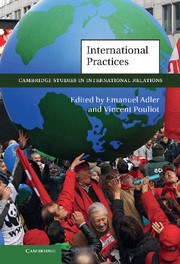Book contents
- Frontmatter
- Contents
- Figure
- Note on the contributors
- Acronyms and abbreviations
- Part I Practices in International Relations and social theory
- 1 International practices
- 2 Making sense of “international practices”
- Part II Practices and their background
- Part III The evolution of practices
- Part IV Practices in practice
- Part V Conclusion
- Index
- References
1 - International practices
introduction and framework
from Part I - Practices in International Relations and social theory
Published online by Cambridge University Press: 05 June 2012
- Frontmatter
- Contents
- Figure
- Note on the contributors
- Acronyms and abbreviations
- Part I Practices in International Relations and social theory
- 1 International practices
- 2 Making sense of “international practices”
- Part II Practices and their background
- Part III The evolution of practices
- Part IV Practices in practice
- Part V Conclusion
- Index
- References
Summary
In this book, we invite students of International Relations (IR) to approach world politics through the lens of its manifold practices. By focusing on what practitioners do, we zoom in on the quotidian unfolding of international life, from multilateral diplomacy to finance trading through environmental negotiations. We analyze the ongoing accomplishments that, put together, constitute the “big picture” that is variously described by existing IR theories. Of course, practices have long been a prime object of analysis in the IR discipline. Building on the “practice turn” that has recently been taken in social theory, we develop and systematize an interparadigmatic research program that takes competent performances as its main entry point in the study of world politics. Our claim is not that practice offers the universal, grand theory or totalizing ontology of everything social. Instead, taking international practices seriously spells out the many faces of world politics, including power and security, trade and finance, strategy, institutions and organizations, resources, knowledge and discourse, etc. in action, as part of a “doing” in and on the world.
The study of international practices has gained significant momentum recently. In IR, among the first scholars to draw attention to practices were the poststructuralists who, building on the path-breaking works of Michel Foucault, among others, revisited world politics as a set of textual practices. One of the key insights brought to IR by poststructuralism is precisely that the complex pictures of world politics are made up of a myriad of everyday practices that too often go overlooked in scholarly research. At about the same time, a number of IR scholars inspired by the works of prominent social theorists such as Pierre Bourdieu started to put matters of practice at the center of their analyses. Coming from the emerging constructivist corner, growing interest in “deeds” and “practical reasoning” also contributed to establish international practices as valid objects of analysis in the discipline. That said, the recent turn to practice in IR came only at the turn of the millennium when, building on a similar intellectual movement in social theory, Neumann advocated “returning practice to the linguistic turn.” Since then, a rapidly increasing number of scholars have joined the fray.
- Type
- Chapter
- Information
- International Practices , pp. 3 - 35Publisher: Cambridge University PressPrint publication year: 2011
References
- 107
- Cited by



